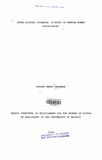| dc.description.abstract | This study is on the subject of inter-spousal physical
violence with specific reference to women's experiences of
physical violence within heterosexual relationships. Physical
violence in domestic relationships is one of the many forms of
violence played out in domestic spaces. The practice of interspousal
physical violence is therefore examined in the context
of domestic violence. Narrowing the focus of this study to
inter-spousal physical violence was determined by the need to
theoretically and practically differentiate acts of physical
violence between spouses In the domestic space from other
forms of domestic violence. Physical violence is qualitatively
different from other forms of domestic violence.
The study further recognizes that either spouse in a
heterosexual relationship has the potential of bec9ming a
victim or perpetrator of physical violence. Nevertheless,
overwhelming evidence from around the world shows that women
are usually majority of victims where inter-spousal violence
is concerned
(Dobash and Dobash 1979; Counts, Brown and
Campbell 1992; Davies 1994).
The term domestic relates to the private sphere. The term
domestic can trivialize violence, placing it as a private matter
that does not warrant outside intervention. The terminology has
historically been associated with a dismissive attitude towards the
seriousness of violence in the home thus leaving too many victims
especially women unassisted in dangerous and demoralizing
circumstances (DVIRC 1998) .
The main objective of the study was to examine the nature and
extent of inter-spousal physical violence and conflict
management among spouses. The study adopted inter-methods and
intra-methods triangulation approaches to data collection.
Data was collected from women and men in two residential
estates, i.e. Kangemi and Huruma both located in Nairobi
Province. A total sample of 200 women was selected through
systematic sampling. Focus Group Discussions (FGD) and Indepth
Interviews were conducted to complement survey data. The
study sites and sample sizes were purposively selected.
Findings show that inter-spousal physical violence is
prevalent with maj ori ty of the respondents reporting having
experienced at least one form of minor physical violence in
the 12 months prior to the study. A smaller proportion
reported having experienced a severe form of violence in the
twelve months prior to the study. Consequently, results show
that respondents experience minor forms of violence more than
severe forms of violence. Some respondents reported having
received severe injurie~ after severe acts of violence.
Several recommendations have been made on the basis of
resultant findings. The government needs to quicken the
adoption of the domestic violence bill, which would
materialize in passage of laws designed to protect individuals
from spousal violence. The government should also play its
role In making law enforcement officers and the criminal
justice system more accessible, especially to women and more
responsive to their complaints . Supportive services such as
shelter homes, childcare services, special women's courts,
medical and psychological service referrals, educational
facilities and assistance In accessing financial maintenance
are possible intervention strategies. In addition, public
awareness campaigns; gender justice and sensitization
seminars; concentrated outreach efforts such as public
rallies; legal and health literacy camps directed to men and
women would serve to desensitize individuals to the use of
violence. In an effort to reinforce the criminalization of
domestic violence police stations should be made more
approachable and less intimidating to individuals reporting
cases of spousal violence. The police should be trained to be
more sensitive to gender-related crimes. To strengthen
research in this area, a database on spousal violence should
be developed and maintained. | en |

